Our live coverage is movingpublished at 01:31 BST 16 April 2022
For technical reasons, we are moving our live coverage.
Please join us at the new webpage here.
The police chief of the Kyiv region says the bodies of 900 civilians have been found in towns around the capital, more than a week after Russian troops left
Russia says it has hit a plant making anti-aircraft and anti-ship missiles outside the Ukrainian capital, Kyiv
It came hours after it admitted that the Moskva warship had sunk following an explosion on Wednesday
Ukraine says it hit the Russian cruiser in the Black Sea with missiles - Russia has said a fire on board caused the sinking
Russia's defence ministry said attacks on Kyiv would be intensified if Ukraine targeted Russian territory
The UN says more than five million Ukrainians have been forced out of their homes during the conflict
Edited by Jude Sheerin
For technical reasons, we are moving our live coverage.
Please join us at the new webpage here.
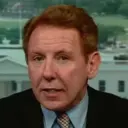 David Willis
David Willis
LA correspondent
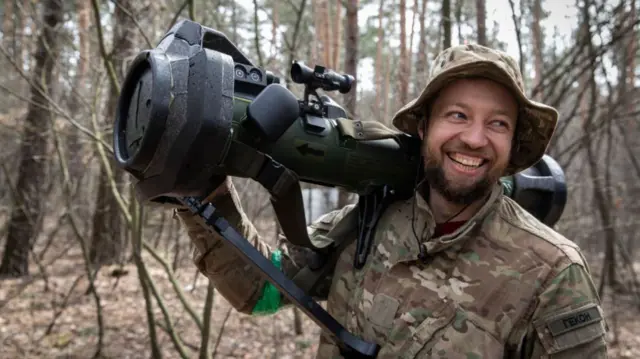 Image source, Getty Images
Image source, Getty ImagesA Ukrainian soldier holds a UK-supplied rocket launcher
Russia has formally warned the US - and other allied nations - against supplying weapons to Ukraine.
The warning came in a formal diplomatic note from Moscow, a copy of which has been reviewed by media outlets in the US.
The two-page diplomatic note – forwarded to the US State Department by the Russian embassy in Washington - warns that US and Nato weapons shipments are "adding fuel" to the conflict in Ukraine, and could lead to what Russian diplomats refer to as "unpredictable consequences".
It was sent on Tuesday, just as word of a new US military aid package for Ukraine had started to leak out. Only hours later President Biden approved the shipment of $800m of military assistance - including, for the first time, long range artillery weapons such as howitzers – with the aim of matching Russia’s military capability in Ukraine.
A senior US administration official was quoted as saying the warning could be seen as a concession by Russia that US and Nato military assistance to Ukraine was proving effective.
The first part of this latest shipment is expected to arrive in Ukraine in the next few days, as Russian forces continue to mobilise in the east of the country, ahead of what is expected to be a major assault on the disputed Donbas region of Ukraine in the next few weeks.
Since the war began the US has supplied more than $3bn in military assistance to Ukraine.
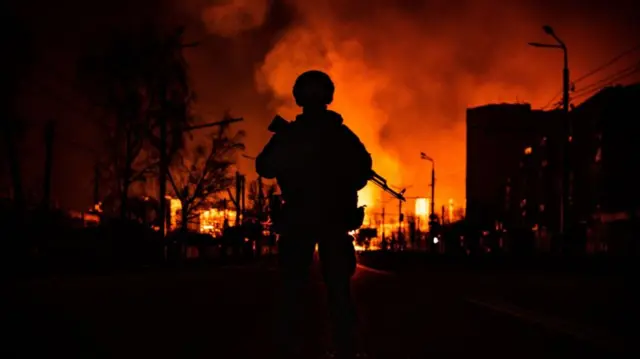 Image source, Getty Images
Image source, Getty ImagesThe SAS, Britain's famed special forces corps, has been training Ukrainian soldiers on the ground in the Kyiv region, Ukrainian military sources have told The Times of London, external.
Officers from two battalions told the newspaper on Friday that SAS troops led training sessions last week and the week before.
One commander said the trainers showed how to use NLAWs, a type of British anti-tank missile.
The report of serving British soldiers on the ground in Ukraine for the first time has not been confirmed by the UK Ministry of Defence.
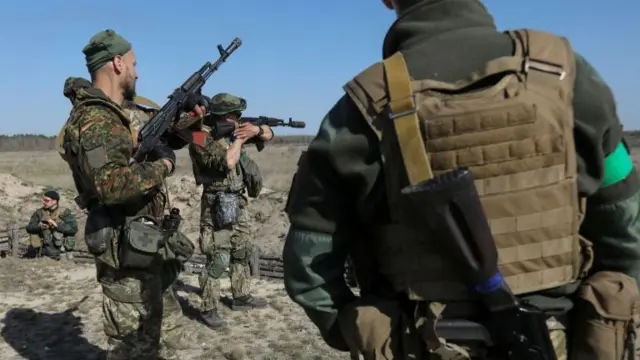 Image source, Reuters
Image source, ReutersIf you're just joining us or need a catch-up, here are the latest developments in Ukraine:
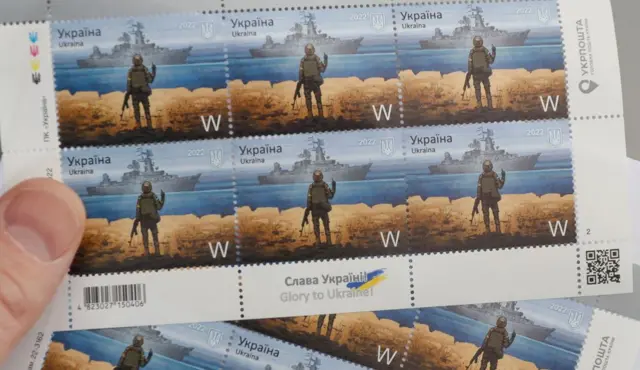 Image source, Reuters
Image source, ReutersUkraine celebrates wartime defiance with this popular stamp
For a second day big queues formed at post offices in Kyiv as Ukrainians rushed to buy commemorative stamps showing a Ukrainian border guard defying the Russian warship Moskva with a rude gesture.
But many were disappointed, Unian news agency says, as supplies of the stamps and souvenir envelopes ran out. The postal service Ukrposhta said more sheets of the stamps would go on sale on Monday.
Now the stamp is treasured all the more because the Moskva – pride of Russia’s Black Sea Fleet – sank after a fire and explosion on Thursday. Ukraine says it sank the cruiser with two missiles, while Russia says only that a fire and explosion on board sank it.
The stamp was the result of a national competition last month. Border guard Roman Gribov became a national hero for his gesture near Snake Island in the Black Sea, when the Russian navy told him and his comrades to surrender.
An Ukrposhta tweet featuring the stamp says “we announce a competition for the next target”, tapping into Ukrainians’ defiant spirit.
And another Ukrposhta tweet, external shows a long queue at a post office, with the message: “Perhaps for the first time in history the queue for a postage stamp is longer than one for an iPhone.”
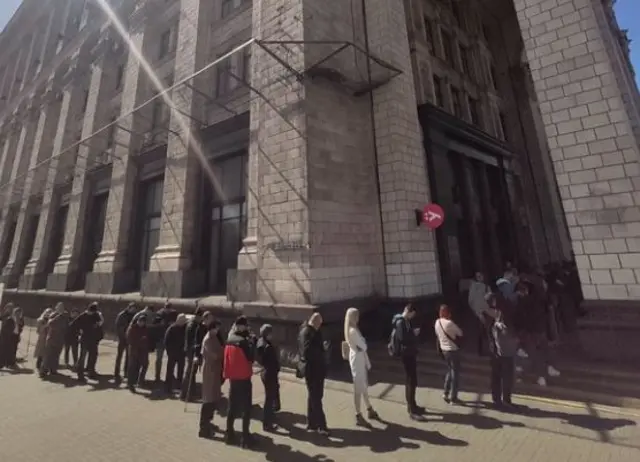 Image source, Ukrposhta/Twitter
Image source, Ukrposhta/TwitterOne of the queues in Kyiv to buy the Moskva warship stamps
The grandmother of a British man who was reportedly captured while defending Ukraine said she was horrified to see him appearing in photos and video footage restrained in handcuffs.
Russian sources claim Aiden Aslin, who is originally from Newark in Nottinghamshire, has been captured in the besieged city of Mariupol.
Ukraine war: Grandmother 'horrified' by capture of British fighter
Hayley Clarke
BBC News
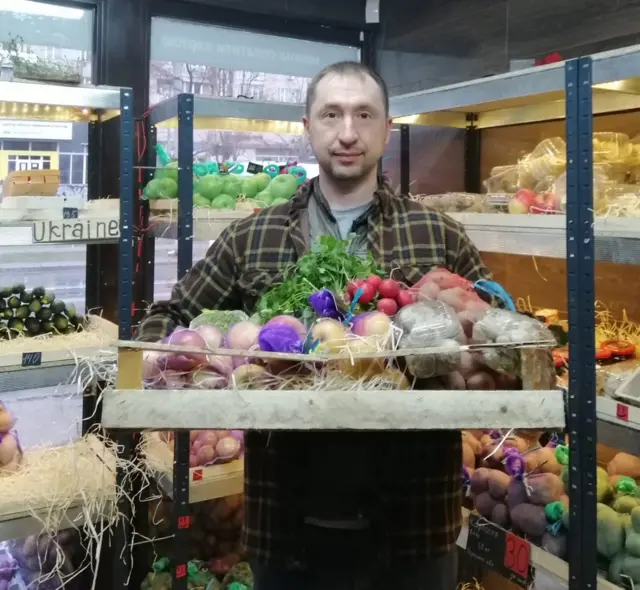 Image source, Alexander Pavlovsky
Image source, Alexander PavlovskyAlexander Pavlovsky, a farmer from Odesa, has set up a food charity for his countrymen fleeing the war.
Prior to the invasion, he had a large farm where he grew strawberries, grains and vegetables. For the past 40 days, he and family have been sleeping in a basement every night.
Pavlovsky has dedicated himself to starting the Free Borscht Initiative, a charity that purchases crops from local farmers and delivers boxes of fresh food to refugees in need.
“Odesa is not safe, it’s getting hit by rockets. But it’s relatively safe compared to Mariupol and other places where they’re going through hell," he tells the BBC.
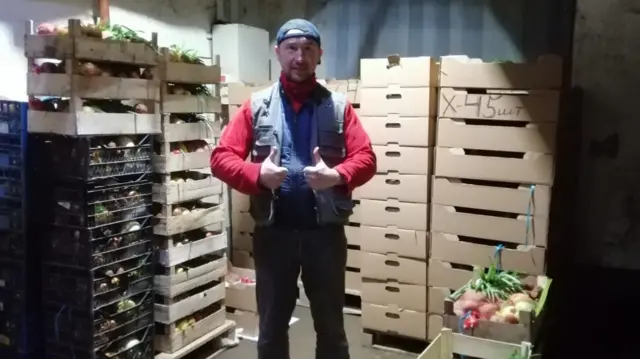 Image source, Alexander Pavlovsky
Image source, Alexander PavlovskyFarmers in Ukraine are struggling to sell their produce due to the Russian occupation, he says. Meanwhile people are going hungry.
"My idea is to connect the two: buying from local farmers, helping them to support their families. Giving it to people in need, who have nothing at all."
He has so far given away about 200 boxes that contain enough food to feed a family for three to four days.
“My goal is to distribute 1,000 every two weeks, maybe more if I can," he says, adding that up to 3,000 evacuees are arriving in Odesa every day.
“The people coming from places like Mariupol, the first emotion that comes to my mind is shame - they are ashamed of receiving help.
"They’re not used to that in their previous life. But they need it.”
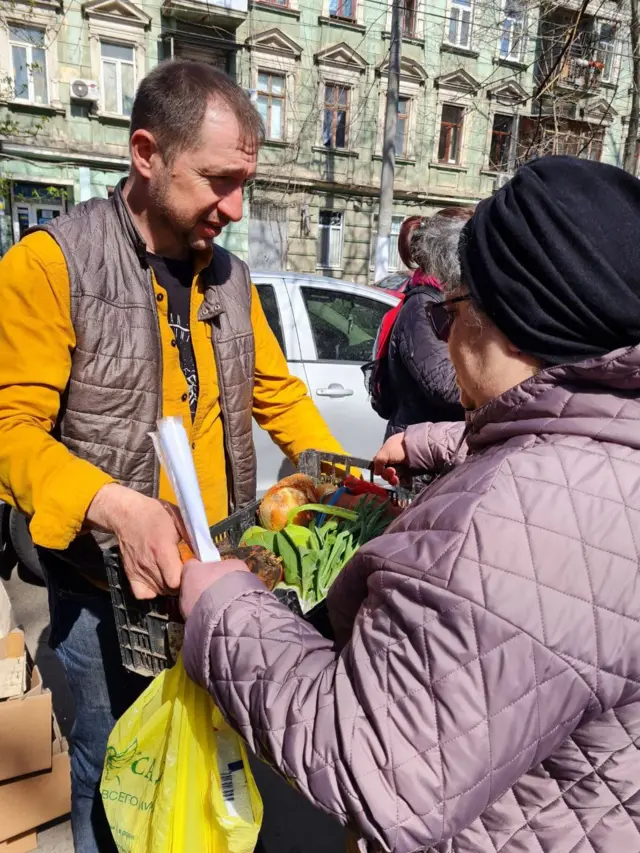 Image source, Alexander Pavlovsky,
Image source, Alexander Pavlovsky,Seven people have died and 34 were injured by Russian shelling in the eastern city of Kharkiv, the region's governor says.
Oleg Synegubov said Russia had fired on a residential area. He said three of the wounded were children and one of those killed was a seven-month-old baby.
Russia denies it targets civilians, despite considerable evidence that non-combatants' homes have been hit by Russian strikes, and civilians shot dead in execution-style killings or while fleeing cities under bombardment.

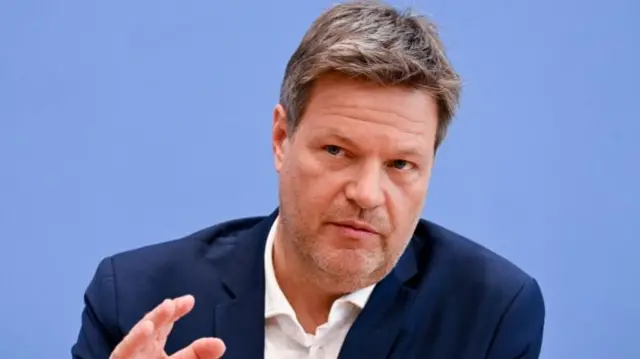 Image source, EPA
Image source, EPAEconomics Minister Robert Habeck says reducing gas and oil dependency starts with personal behaviour
Germans are being urged to turn down their heating by a degree and use the train or bike over Easter to help reduce their dependence on Russian gas and oil.
"It's easy on the wallet and annoys Putin," says Economics Minister Robert Habeck, who's also joint leader of the Greens, one of three parties running Germany.
Germany is under pressure from several other EU countries to agree to a complete ban on Russian energy but it currently relies on Russia for 40% of its gas and a quarter of its oil.
Ukrainian leader Volodymyr Zelensky criticised Germany for moving too slowly on an energy embargo, during his interview with the BBC this week.
German economic institutes warn that immediately halting Russian imports would spark a sharp recession in Europe's biggest economy. But Zelensky says Ukraine's partners need to understand that for his country, it is an issue of survival.
Further allegations are emerging of civilian evacuees being killed by Russian troops. Ukraine's ombudsman for human rights says Russians opened fire on two buses transporting civilians to safety from the country's east, where fighting is escalating.
Several people were killed and injured on the journey from the town of Starobilsk in the Luhansk region to the city of Dnipro, ombudsman Lyudmyla Denisova said.
Denisova said on Facebook that full details of what happened were still being established.
Earlier, we reported allegations that at least seven people were killed and 27 wounded when Russians fired on buses evacuating civilians from the town of Borova in the Kharkiv Region.
The BBC has not been able to independently verify these claims.

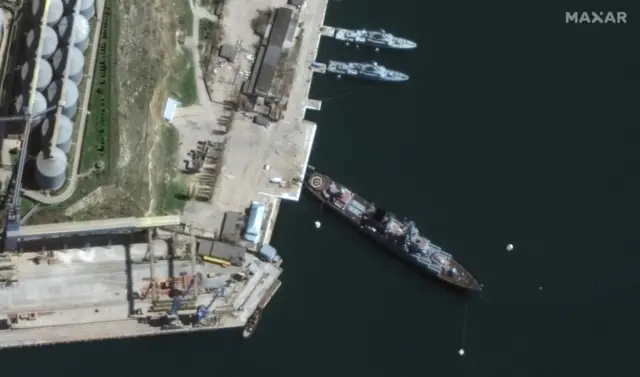 Image source, Maxar Technologies/Reuters
Image source, Maxar Technologies/ReutersA satellite image of the Moskva in Crimea, days before its sinking
We've been reporting on the sinking of the Moskva Russian warship today, which Ukraine claims it hit with Neptune cruise missiles.
According to Dr Fotios Moustakis, Associate Professor in Strategic and Security Studies at the University of Plymouth, this is the first time Neptune missiles have been used during the war.
Dr Moustakis said this is significant as it clearly demonstrates that Ukraine was taking its time to identify and hopefully destroy a highly symbolic Russian ship.
The sinking is important from a psychological perspective, he added.
Russia says the ship went down after a fire on board, but US defence sources have now backed Kyiv's version of events in comments to multiple news agencies.
A senior Pentagon official told AFP the incident was a "big blow" for Moscow.
Churches in Ukraine will be closed during the curfew for Orthodox Easter, taking place on Sunday 24 April.
The news has been reported by Ukraine's police, the Orthodox Church of Ukraine and the Ukrainian Greek Catholic Church.
The consecration of Easter baskets will still be held, but it will also respect the curfew.
Orthodox Easter services, due to take place next week, will also be cancelled during the curfew.
Further to the news of some successful evacuations, the office of Ukraine's prosecutor general has also alleged that several people were killed and injured on Thursday while trying to flee the country's east.
"On April 14, Russian servicemen fired on evacuation buses carrying civilians in the village of Borova in the Izium district," a statement said.
"Preliminary data shows seven people died. Another 27 people were injured."
The BBC has not verified the claim.
Last week Russian forces were accused of deliberately mounting a deadly attack on a train station in the eastern city of Kramatorsk, where people were waiting for evacuation trains.
Ukraine crisis: Burnt-out cars and debris at Kramatorsk station
As we reported earlier, nine humanitarian corridors have been set up to allow people out of areas of active fighting in east Ukraine.
The country's deputy prime minister said 2,864 people had managed to leave those regions today. The figures included 363 from Mariupol, who managed to get out of the devastated city on their own.
Russian troops have had Mariupol under siege for weeks and refuse to agree to the organised evacuation of people, either by Ukrainian authorities or the Red Cross.
Today's evacuees join more than five million people who have been forced out of their homes since the invasion began, the UN says.
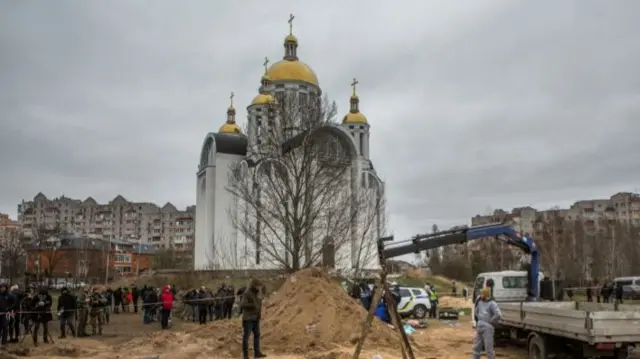 Image source, Reuters
Image source, ReutersUkrainian authorities continue to discover more bodies around the capital, Kyiv, more than a week after Russian troops left the area to concentrate on east Ukraine.
"Regretfully, I can say that we have found the bodies of 900 deceased civilians and transferred them to forensic experts," Kyiv Region police chief Andriy Nebytov told a briefing.
Nebytov said more than 350 of the bodies were retrieved from Bucha - where evidence of atrocities has led to accusations of war crimes against Russian troops, vehemently denied by Moscow.
The removal of rubble in Borodyanka and Makarov is still ongoing and "there will still be bodies of dead people under the rubble," the police chief added.
He stressed that those killed were civilians and had nothing to do with military formations.
The BBC is unable to verify these specific claims independently.
However, BBC journalists have seen bodies in civilian clothes on the roads outside Kyiv, and documented the sizeable operation to collect and identify the dead in Bucha.
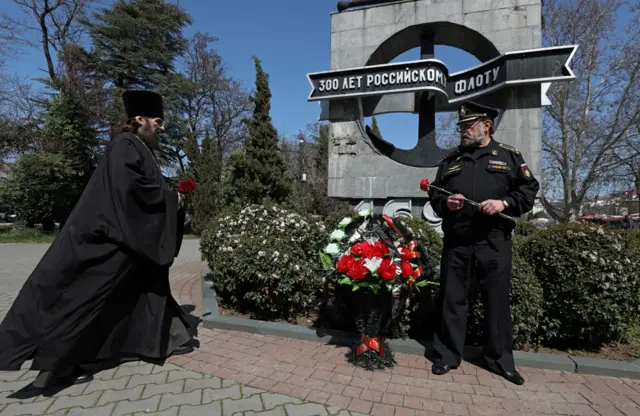 Image source, Reuters
Image source, ReutersAn Orthodox priest joined in mourning for the Moskva in Sevastopol
Russia has held a ceremony to mourn the loss of its Black Sea Fleet flagship Moskva, the missile cruiser which sank on Thursday after munitions exploded on board.
The ceremony took place in Sevastopol, the fleet’s base in Russian-annexed Crimea.
Ukraine says it hit the Moskva with two anti-ship missiles, which set the ship ablaze.
Russia’s defence ministry reported the fire without specifying its cause and said the blaze had detonated on-board munitions. It sank in a storm while being towed to Sevastopol, the ministry said.
At the ceremony, Capt (reserve) Sergei Gorbachev said the Moskva “was a symbol for everyone, symbol of our power, our hope, the revival of the fleet in the 90s”.
And a priest said losing the Moskva was “a tragedy for all those tens of thousands of people who served there for over 20 years”.
The Soviet-built ship was playing a major role co-ordinating fleet operations off Ukraine.
Russia has given no casualty figures concerning the Moskva. The defence ministry said the crew were rescued by other fleet vessels in the area.
No total has been given for the crew on board at the time - various sources estimate that it was 510.
Sevastopol’s Governor Mikhail Razvozhayev said “the crew was evacuated, they were rescued. That’s the main thing. We await our heroes in Sevastopol”.
Ilya Ponomaryov, a former Russian MP who now lives in Kyiv, alleges that just 58 crew members out of 510 survived. But it is not clear where he got that figure from.
Ukrainian reports - unconfirmed - say the ship’s captain Anton Kuprin was among those who died when the ship caught fire and blew up.
Last month Sevastopol mourned the loss of Black Sea Fleet deputy commander Andrei Paliy, killed in the war-torn port city of Mariupol on 20 March.
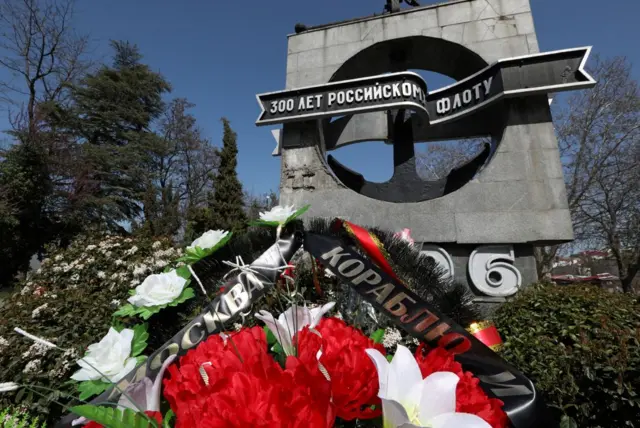 Image source, Reuters
Image source, ReutersThe wreath's black ribbon says "to the ship Moskva"
 Catherine Byaruhanga
Catherine Byaruhanga
BBC News reporting from Odesa, Ukraine
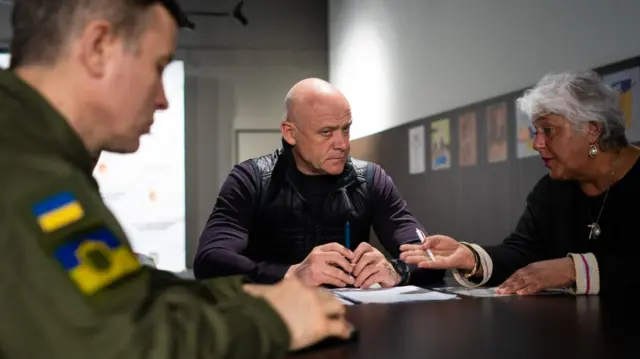
The mayor of the port city of Odesa has told the BBC that one of the biggest threats in the Black Sea region has been taken away, after the Russian warship Moskva sank. The flagship carrier was destroyed after it suffered an explosion and fire.
Mayor Gennadiy Trukhanov told me: "The Moskva cruiser had the most modern missile equipment. It was a big threat for us as it could have supported an attack by land if it happened here.”
The historic city of Odesa has Ukraine’s biggest seaport and has been living in fear of a full-scale invasion by Russia’s navy positioned offshore.
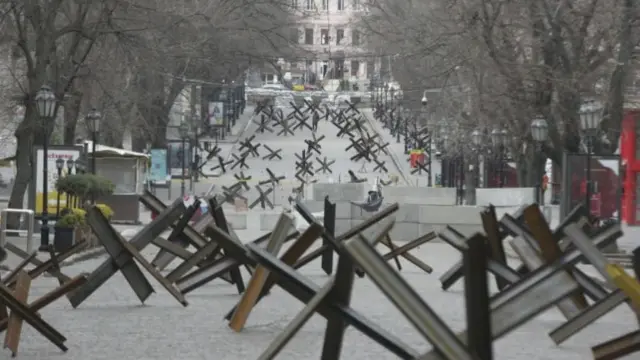 Image source, EPA
Image source, EPAA view of a barricaded street in Odesa on 18 March
Even though the warship is now destroyed, Mr Trukhanov warned that the situation is still dangerous.
“Unfortunately, the enemy has missiles - not only those that were on the Moskva cruiser but also on the land, in Crimea too. We can see it, as there were attacks in Ukraine last night. They were done from the territory of Crimea.”
And there was another reminder of the threat from Russia. Rockets hit the coastal city of Mykolaiv to the east of Odesa. The army there told the BBC several civilians were killed or injured. There has been no comment from Moscow on the strike.
The US also believes there were casualties when the Russian missile cruiser Moskva sank, the same official tells Reuters news agency.
The senior US official, who was speaking on condition of anonymity, said the number of casualties was unclear.
The ship had a crew of about 500 sailors, and Russia previously said they were successfully evacuated to other ships.
In a Facebook post , externalbefore the ship sank, Ukrainian officials said Russian rescue efforts were being hampered by ammunition exploding on board and stormy weather.
The BBC is currently unable to verify whether lives were lost.
The United States now believes that the Russian Moskva warship that sank was hit by two Ukrainian missiles, a senior US official has told Reuters news agency.
Kyiv says its missiles hit the ship, but Russia has not reported any attack and claims the vessel sank after a fire caused its ammunition to explode.
Ukrainian military officials said they struck the Moskva with Ukrainian-made Neptune missiles - a weapon designed after Russia's annexation of Crimea in 2014, which increased the naval threat to Ukraine in the Black Sea.
Moscow has declared 18 members of the EU delegation in Russia "persona non grata".
The staff members "will have to leave the territory of the Russian Federation in the near future," the foreign ministry said in a statement.
Responding, the EU said it "deplores the unjustified, baseless" order, adding there were "no grounds for Friday's decision by the Russian authorities beyond being a pure retaliatory step".
Dozens of Russian diplomats have been expelled by EU countries over the past month.
At the end of March, Ireland, Belgium, the Netherlands and the Czech Republic issued coordinated orders to expel a total of 43 Russian embassy staffers suspected of spying.
And on 5 April, the EU ordered 19 Russians to leave host nation Belgium for "engaging in activities contrary to their diplomatic status".
Russia has tended to respond to such decisions with reciprocal action.